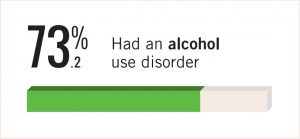Alcohol Awareness And Gambling Disorder Posted On
April is Alcohol Awareness Month. During this month, a special emphasis has been placed on raising awareness about alcohol use, addiction, treatment and recovery opportunities. Having the conversation about problems from gambling during Alcohol Awareness Month is important because of the strong link between alcohol addiction (i.e. alcoholism) and gambling disorder.
Drinking alcohol and gambling have gone hand-in-hand for a long time. Have you ever wondered why? People who gamble may say that the drinks loosen them up, but another reason is because of the effect of alcohol to lower a person’s inhibitions. Many times, lowered inhibitions means more risky choices, like spending more money and time gambling. Someone who regularly drinks alcohol and gambles may be spending more time and money than planned, which is a
Similarities Between Gambling Disorder and Alcoholism
Alcoholism and gambling disorder are very similar. A simple explanation for both is that gambling/drinking takes priority over their activities of daily life. Some warning signs a person who may be struggling with gambling disorder and/or alcoholism may include:
- Gamble/drink more frequently to get the same feeling;
- Feel preoccupied with thoughts of the next time they will be able to gamble/drink;
- Feel physical symptoms of withdrawal such as nausea or anxiety from a lack of gambling/drinking ;
- Continue to gamble/drink despite the fact that their relationships have been affected by their behavior.
These are just some examples of the similarities between alcoholism and gambling disorder. The activity may be different, but their addictive qualities are very similar.
Additionally, strong link between alcoholism and gambling disorder has been studied and proven. In a national study, 73.2% of people diagnosed with gambling disorder had an alcohol use disorder (a.k.a. alcoholism)
Gambling disorder has only recently been identified in the Without realizing it, they may be transferring their first addiction to alcoholism to the addiction of gambling disorder.
Differences Between Gambling Disorder and Alcoholism
The one thing that separates gambling disorder from alcoholism is that with alcoholism there are obvious signs. A person intoxicated may look disheveled in their appearance and struggle to walk properly, they may speak slowly with a slurred speech, and may smell of alcohol.. These are only a few of the physical symptoms that alcoholism has. Signs of gambling disorder are much less obvious.
Someone who is gambling through their savings accounts and retirement funds, going without proper medication and nutrition for money to gamble, and losing their loved ones because of deceit and distrust due to gambling may seem irritable and angry. Feeling irritable and angry are not specific to gambling disorder, which is why gambling disorder is known as the hidden addiction. The ability to hide an addiction to gambling is the thing that drastically separates gambling disorder from alcoholism.
Seeking Help
It’s very important for people seeking treatment for alcoholism and/or gambling disorder be aware of the possibility to be addicted to both. Whether seeking help from family, a group like a fellowship organization (i.e. Gamblers Anonymous and Alcoholics Anonymous), or treatment by a trained clinician or treatment center, it’s important to let your recovery team know about BOTH your alcohol and gambling habits.
Recovery is possible. People have recovered from gambling disorder and alcoholism and live wonderful lives. For additional local options for help, please call the NYS HOPEline at 1-877-8-HOPENY (1-877-846-7369). You can call or text this number 24 hours a day, 7 days a week for help locating the help in your community.


